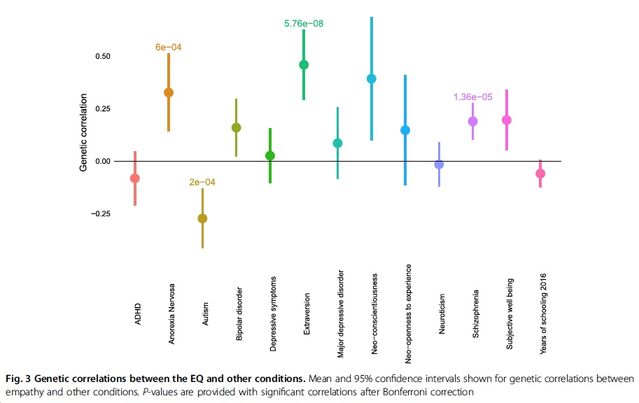Empathy
Genome Study Finds Empathy Opposite in Autism vs. Psychosis
Empathy is linked to both being female and to psychosis, but not to autism.
Posted September 27, 2018
Empathy is a key mentalistic ability which is said to be deficient in both autistics and psychotics, along with most other such skills. But according to the diametric model of mental illness, autism spectrum disorder (ASD) is symptomatically the opposite of psychotic spectrum disorder (PSD), such as schizophrenia. Indeed, according to the model, empathy can even be an instance of hyper-mentalism, as I showed in a previous post.
Now the first genome-wide association study (GWAS) to do so has examined self-reported measures of empathy, notably Empathy Quotient (EQ), in 46,861 research participants recruited from 23andMe Inc. As figure 3 below from the paper reporting the findings illustrates:

As predicted, based on earlier work, we confirmed a significant female advantage on the EQ (…). We identified similar SNP heritability and high genetic correlation between the sexes. Also, as predicted, we identified a significant negative genetic correlation between autism and the EQ (…). We also identified a significant positive genetic correlation between the EQ and risk for schizophrenia (…), risk for anorexia nervosa (…), and extraversion (…).
Indeed, in the figure above the autism plot is an almost exact mirror image of the schizophrenia one.
As the authors also point out, “anorexia nervosa is primarily diagnosed in women, and autism is primarily diagnosed in men.” Nevertheless,
Despite the high genetic correlation, sex-specific correlations with anorexia nervosa were significant only for the females-only GWAS dataset. This suggests that the sex-specific genetic component of empathy can contribute differentially to psychiatric conditions.
But the imprinted brain theory also predicts that female genes—notably X-chromosome ones—are also implicated in PSD because all mothers are female; while the fact that all fathers are male means that male-specific gene expression is correspondingly implicated in ASD.
In other words, just what we ordered. More GWAS for ASD/PSD please!
(With thanks to Bernard Crespi for bringing this to my attention.)


